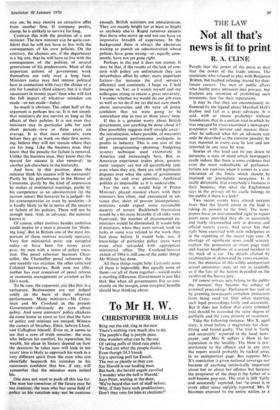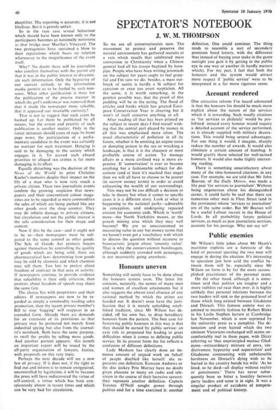THE LAW
Not all that's news is fit to print
R. A. CLINE
People fear the power of the press as they fear the power of the trade unions. The musicians who refused to play with Benjamin Britten, but loathed refusing, feared for their future careers. The men of public affairs who loathe press intrusion into privacy, but disclaim any intention of prohibiting such intrusions, fear for their reputations.
It may be that they are unconsciously in- fluenced by the legend about Marshall Hall's decline and fall as a great advocate. It is said, with or (more probably) without foundation, that in a certain trial in which he was engaged he cross-examined a newspaper proprietor with fervour and success; there- after he suffered what for an advocate can only be described as the extreme penalty; he was reported in every case he lost and not reported in any case he won.
Stories of this kind can be put down to paranoia, a state of mind which newspapers easily induce. But there is some evidence that even the most redoubtable of parliamen- tarians are cautious when it comes to a con- sideration of the limits which should be imposed on journalistic noseyness. Is it really defensible that everybody's business is their business, that what the Englishman says in the privacy of his castle belongs to the public if there is a leak?
Two recent events have stirred anxious fears that the fourth estate in the land is taking its powers to the limit. The news- papers have an untrammelled right to report court cases provided they do so accurately and fairly (trammelled only in divorce and official secrets cases). And never has that right been exercised with such indulgence as in the reporting of the recent rape case. A shortage of significant news could scarcely explain the promotion to front page rank and banner headlines of a sexual incident in the back of a car. The details elicited by examination or elaborated by cross-examina- tion, the minutiae of this wildly unimportant sexual encounter, were set out as carefully as if the fate of the nation depended on the verdict of the Sussex jury.
Of course private acts belong to the public the moment they become the subject of
criminal proceedings. Parliament has said so by granting newspapers complete protection from being sued for libel when reporting such legal proceedings fairly and accurately. But it does not follow that every criminal
trial should be accorded the same degree of publicity and the same priority of treatment. Take the following instance. Mrs X, aged sixty, is tried before a magistrate for shop- lifting and found guilty. The trial is 'fairly and accurately' reported in the local news- paper. and Mrs X suffers a blow to her reputation in the locality. The blow is pro- portionate to the offence and in any case the report would probably be tucked away in an unimportant page. But suppose Mrs X's conviction is given national coverage not because of anything intrinsically important about her or about her offence but because the proprietor of the shop is the father of a well-known pop-star. The trial is still 'fairly and accurately' reported, but 'he event is in
every other sense unfairly reported. Mrs X becomes exposed to the entire nation as a
shoplifter. The reporting is accurate; it is not libellous. But it is grossly unfair.
So in the rape case sexual behaviour which should have been known only to the participants becomes as nationally notorious as that bridge near Martha's Vineyard. The two protagonists have sustained a blow to their reputations which bears no relation whatsoever to the insignificance of the event itself.
Why? No doubt there will be journalists who comfort themselves with the parrot cry that it was in the public interest to dissemin- ate such information. Only the hypocrisy of our current attitude to the information media permits us to be fooled by such non- sense. What other justification is there for the publication of the precise manner in which the girl's underwear was removed than that it made the newspaper more saleable, that it appeased our insatiable curiosity?
That is not to suggest that such cases be hushed up. Let them be publicised by all means; but the extent and priority of such publication is another matter. Only in the rarest instances should cases of rape be front page news; the participation of a parlia- mentary candidate in the event was certainly no warrant for such treatment. Hanging is said to be damaging to the society which engages in it. To accord such absurd priorities to alleged sex crimes is far more damaging in its effect.
Equally disturbing was the decision of the News of the World to print Christine Keeler's memoirs despite their impact on the life of a man who is now very much a private citizen. These two journalistic events confirm the growing suspicion that news- papers and their concomitant colour maga- zines are to be regarded as mere commodities the sales of which are being pushed like any other goods over the shop counter. They may do infinite damage to private citizens, but circulation and not the public interest is the sole consideration for their shape and content.
Now if this be the case—and it ought not to be so—then newspapers must be sub- jected to the same control as other goods.
The Sale of Goods Act protects buyers against themselves by controlling the quality of goods which are being sold; there are pharmaceutical laws determining how goods may be sold by chemists and which chemists may sell them. Too late to protest about freedom of contract in that area of activity. If newspapers continue to provide evidence that saleability is their only criterion, then protests about freedom of speech may share the same fate.
The choice lies with proprietors and their editors. If newspapers are now to be re- garded as simply a commodity needing sales promotion, then the recent private member's Bill to stop 'bugging' will reappear in an extended form. Already there are demands for an extension of its provisions so that privacy may be protected not merely from industrial spying but also from the journal- ist's notebook. Both have the same purpose, to swell the profits by selling more goods.
And another portent appears: this month an important report will be issued by the all-party organisation of lawyers, Justice, with proposals on this very topic.
Perhaps the next decade will see a new law of privacy. If it does not, if the right to
find out and inform is to remain unirppaired, uncontrolled by legislation, it will be because the press will have rediscovered the virtue of self-control, a virtue which has been con- spicuously absent in recent times and which can be very bad for circulation,



































 Previous page
Previous page